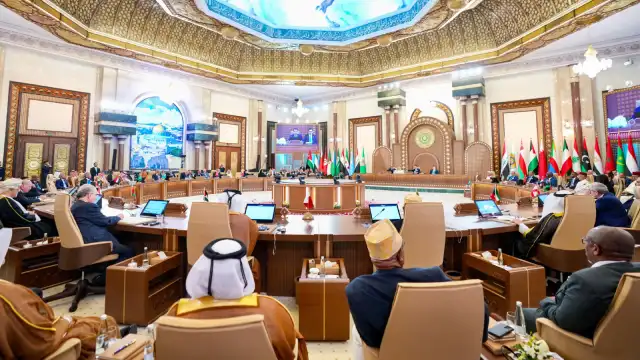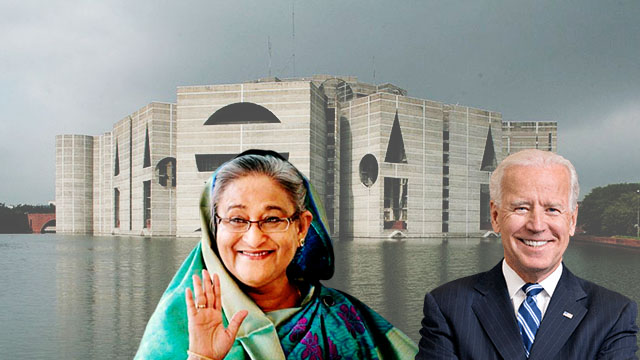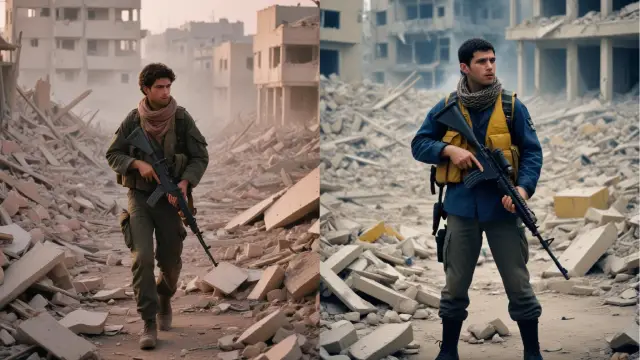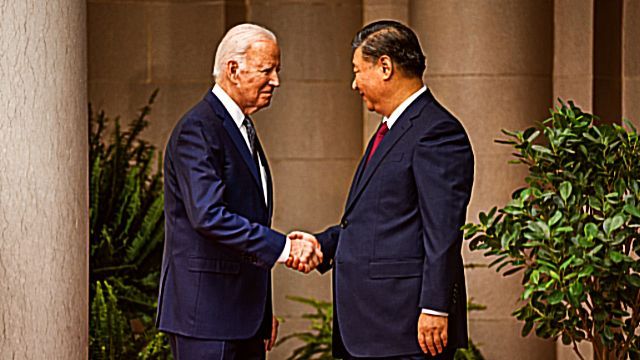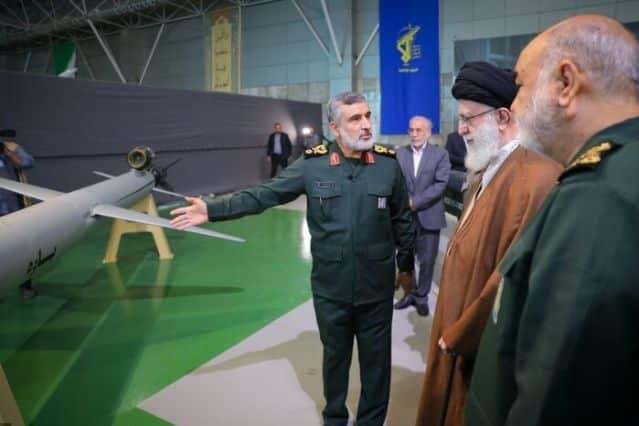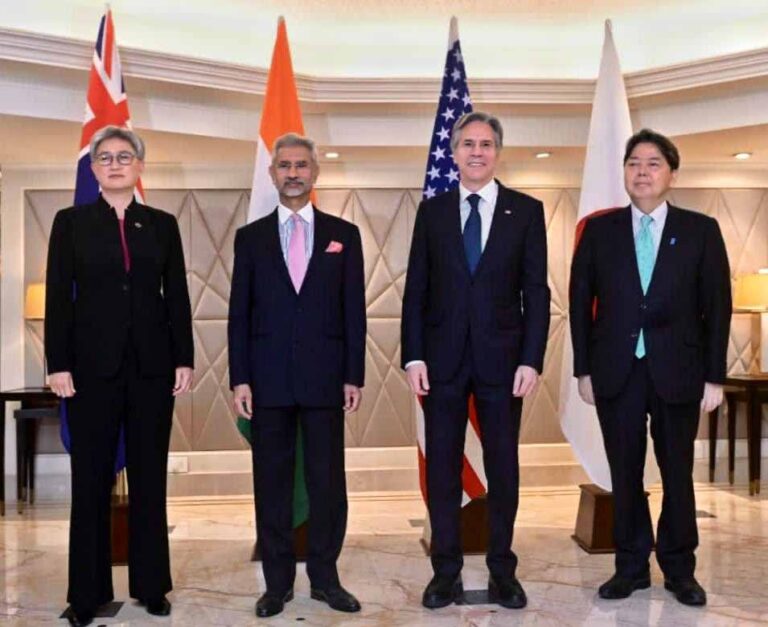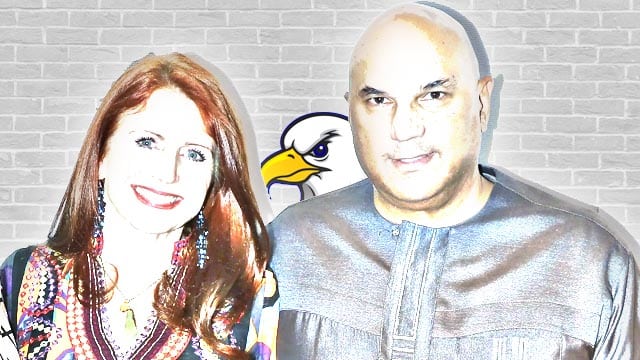The 34th Arab League Summit opened in Baghdad on Saturday, May 17th, amid pomp and ceremony that stood in stark contrast to the grim reality unfolding 800km away in Gaza. As delegates exchanged pleasantries in Iraq’s fortified Green Zone, Israeli forces intensified their bombardment of Khan Younis, forcing the Kuwaiti Field Hospital to suspend operations. The summit—Iraq’s first since 2012—was dominated by discussion of Israel’s 19-month war on Gaza, where more than 53,000 Palestinians have been killed. Yet the gathering highlighted the yawning chasm between the flowery rhetoric of Arab leaders and their practical unwillingness to challenge the American-Israeli agenda that has enabled the catastrophe.
The timing could hardly be more pointed. The Arab League Summit convened just one day after Donald Trump completed his Middle East tour, during which he secured a $600bn Saudi investment commitment to the United States and $142bn in arms sales to the kingdom.
The American president also reiterated his jaw-dropping proposal to “take” Gaza and transform it into a “freedom zone”—diplomatic code for what critics describe as neocolonial control of Palestinian territory.
Speeches and symbolism at the Arab League Summit
Iraq’s Prime Minister Mohammed Shia al-Sudani set the tone in his opening address, describing the situation in Gaza as “genocide” that has “reached a level of ugliness unparalleled in all conflicts in history.”
He pledged $20m for Gaza’s reconstruction and another $20m for Lebanon, which has also endured Israeli attacks.
Mr Sudani proposed the establishment of an Arab fund to support recovery efforts throughout the region—a modest sum given the scale of destruction in Gaza, where nearly every structure has been damaged or destroyed.
Palestinian Authority President Mahmoud Abbas called on summit attendees to adopt a comprehensive Arab plan to end the war, urging the convening of an international conference in Cairo to fund Gaza’s reconstruction.
“We reaffirm our firm stance rejecting all attempts to displace Palestinians from the Gaza Strip under any pretext or circumstances,” said Iraqi President Abdul Latif Rashid, in a thinly veiled rebuke to Mr Trump’s resettlement proposals.
Egyptian President Abdel Fattah al-Sisi, whose country controls Gaza’s vital Rafah crossing, called on the American president to “apply pressure to achieve a ceasefire”—an ironic plea given Egypt’s own enforcement of the blockade.
He emphasised that regional stability would remain elusive without a comprehensive peace and the establishment of a Palestinian state, regardless of any normalisation agreements Israel might secure.
Spanish Prime Minister Pedro Sanchez, attending as a guest, delivered perhaps the summit’s most forceful statement. “Palestine is bleeding before our eyes,” he declared, announcing that Spain would present a proposal to the UN General Assembly for the International Criminal Court to examine Israel’s compliance with humanitarian aid deliveries.
“We need more pressure on Israel to end the carnage unfolding in Gaza by all the conceivable means, namely the tools available under international law,” he said.
Yet for all the strong language, the summit’s final communiqué merely “urged countries and international and regional financial institutions to provide prompt financial support” for Gaza’s reconstruction—language that carefully avoids making concrete commitments from the Arab states themselves.
Trump casts shadow over Arab League Summit
The spectre of American influence loomed large over the proceedings. Al Jazeera reported that Iraqi Foreign Minister Fuad Hussein acknowledged that summit participants would try to endorse decisions made at their March meeting in Cairo to support Gaza’s reconstruction—framed explicitly as “an alternative to Trump’s widely condemned proposal to take over the enclave.”
This reactive posture reveals much about the Arab League’s diminished stature.
Rather than setting an independent agenda based on Arab interests, the organisation finds itself responding to American dictates.
Meanwhile, Mr Trump’s Middle East tour netted billions in arms deals and investment commitments from wealthy Gulf states, reinforcing the transactional relationship that has long characterised American policy in the region.
The American president’s meeting with Syria’s interim President Ahmed al-Sharaa in Riyadh earlier in the week added another layer of complexity.
Mr Trump announced the lifting of sanctions on Syria, a significant boost to Damascus after the fall of Bashar al-Assad‘s Ba’ath Socialist government last December.
Mr al-Sharaa notably missed the Baghdad summit after opposition from Iraqi politicians, highlighting the fractured nature of Arab politics even amid calls for unity.
Perhaps most tellingly, Reuters reported that Russian President Vladimir Putin has invited all Arab League leaders to the first Russia-Arab summit on October 15th—a diplomatic move clearly intended to counter American influence in the region.
The invitation came as Mr Trump was concluding his Gulf tour, underscoring the great-power competition that continues to shape Arab politics more than the needs of Arab citizens.
Gaza bleeds as Arab League Summit deliberates
While delegates deliberated in Baghdad’s comfortable conference halls, the devastation in Gaza continued unabated.
According to the Government Media Office in Gaza, Israeli forces killed approximately 90 Palestinians across the territory on the summit’s opening day alone, with 20 killed and 100 wounded in Khan Younis during the intervening night of Saturday and Sunday.
In the northern Gaza Strip, 200 Palestinians were killed and 300,000 displaced in the 48 hours preceding the summit, with 140 bodies remaining under rubble due to Israel’s prevention of rescue operations.
The Kuwaiti Field Hospital in Khan Younis announced the suspension of operations in its surgical department due to extensive damage from Israeli bombardment, which knocked out generators and electricity.
The timing of this intensified assault—coinciding precisely with the Arab League Summit—suggests a calculated message from Israel to the gathered leaders: your words mean nothing to us.
This brutal reality exposes the hollow nature of summit proclamations.
UN Secretary-General Antonio Guterres, attending as a guest, called for “a permanent ceasefire now, the unconditional release of the hostages now, and the free flow of humanitarian aid ending the blockade now.”
Yet without concrete measures to pressure Israel—such as sanctions or diplomatic isolation—such appeals appear destined to join the long list of ineffectual UN pronouncements on Palestine.
Palestinian factions condemn Arab League Summit’s inadequacy
Palestinian resistance factions expressed deep frustration with the summit’s outcomes.
Hamas urged Arab leaders to fulfil their “historic duties” by enforcing previous resolutions, lifting the blockade, and facilitating aid entry.
They called for sanctions on Israel and prosecution of its leaders, as well as a global campaign to expose what they termed occupation crimes.
The movement highlighted the escalated massacres in northern Gaza that coincided with the summit as evidence of Israel’s contempt for Arab diplomacy.
Palestinian Islamic Jihad was more blunt, dismissing the summit’s statements and condemnations as “meaningless and hollow” unless they led to a halt in genocide, delivery of aid, and an end to famine.
They criticised Arab regimes for “inaction and complicity.”
The Mujahideen Movement condemned “Arab inaction in the face of ongoing genocide, starvation, and ethnic cleansing,” demanding immediate Arab intervention, including cutting ties with Israel and imposing sanctions.
Only the Ahrar Movement offered qualified praise, acknowledging the summit’s statement as “a positive step” while criticising its delay.
They urged Arab states to implement agreed actions within days, using pressure tools on Israel and the United States.
These responses reflect the disconnect between the diplomatic niceties of Arab League gatherings and the harsh reality of Palestinian suffering.
For those enduring Israel’s bombardment, the gap between words and actions has become a matter of life and death.
The bitter irony of the Arab League Summit
The summit’s location in Baghdad highlights another uncomfortable truth.
Iraq, which once positioned itself as a champion of Palestinian rights, has only recently emerged from decades of devastation wrought by American-led invasion and occupation.
As Al Jazeera’s Mahmoud Abdelwahed noted, Iraq views hosting the summit as “a credit to regain its rule as a player to bridge the gap between member states of the Arab League.”
The country’s leadership is understandably keen to project stability after years of turmoil.
Yet this desire for regional acceptance comes at the cost of meaningful solidarity with Palestine.
While Iraq’s $20m pledge for Gaza reconstruction is symbolically important, it pales in comparison to the billions lavished on American arms by wealthy Gulf states.
The Arab world’s priorities are laid bare by these financial decisions: military hardware purchases from the United States far outweigh humanitarian assistance to fellow Arabs under bombardment.
This contradiction exposes the Arab League’s fundamental weakness as a forum for collective action.
Founded in 1945 to protect Arab interests and sovereignty, the organisation has devolved into a venue for performative statements that rarely translate into meaningful policy.
Its member states remain deeply divided by competing interests and are subject to external pressures, particularly from Washington.
The league’s inability to forge an independent path on Palestine—arguably the most unifying issue in Arab public opinion—speaks volumes about its diminished relevance.
Before the summit concludes on May 18th, the Government Media Office in Gaza reported that Israeli drones had burned hundreds of tents sheltering displaced people in Jabalia and Beit Lahia, “all amid suspicious international silence and actual complicity in this ongoing genocide.”
The office held “Israel, America, the UK, Germany, and France fully responsible for this ethnic cleansing,” but also noted the “shameful international silence” that constitutes “a green light for mass killing.”
Conspicuously absent from this list of responsible parties were Arab governments themselves—a diplomatic courtesy not extended by Palestinians in Gaza, who have long since abandoned hope that Arab regimes might meaningfully intervene on their behalf.
As the Arab League Summit’s carefully worded communiqués fade from memory, the bombs continue to fall on Gaza with metronomic regularity.
For Palestinians, the gap between Arab rhetoric and action has never seemed wider.
Join our channels on Telegram and WhatsApp to receive geopolitical updates, videos and more.

